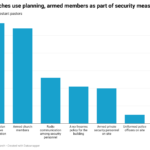
People are planning to be at church for Easter, or at least haven’t ruled that out. Here’s how to make your Easter invites more effective.
By Aaron Earls
On Easter Sunday, Jesus rose from the dead and many Americans rise from their beds.
A 2012 Lifeway Research survey found 93% of pastors say Easter Sunday is one of their church’s highest attendance days.
That’s in part because a 2013 Lifeway Research study found 41% of American adults say they plan to attend church on Easter, including 15% of non-Christians.
People are planning to show up to church for Easter, or at least haven’t ruled that out. Here are five ways to make your Easter invites more effective.
1. Actually invite people.
Nothing is less effective than not inviting people at all. What might surprise many churchgoers is that people are open to faith conversations and church invitations.
Lifeway Research found around half (47%) of unchurched Americans say they would discuss freely if someone wants to talk about their religious beliefs.
Few say they would discuss with some discomfort (12%) or change the subject as soon as possible. (11%).
The vast majority of the unchurched (73%) don’t believe their Christian friends talk about their faith too much.
2. Invite people you know.
The 2016 study of the unchurched found 55% of unchurched Americans say a personal invitation from a family member would be effective in getting them to visit a church.
Similar numbers (51%) say the same about an invitation from a friend or neighbor.
The study also found 79% say they don’t mind their friends talking about their faith, if they really value it.
Encourage members of your church to think about people in their lives that they know or see on a regular basis and start inviting those individuals first.
3. Don’t assume they’re thinking about eternity.
If you are starting that conversation about faith, pointing them to heaven or hell may be something to which they’ve never given much thought.
More than 4 in 10 unchurched Americans (43%) say they never wonder if they would go to heaven when they die.
Around 3 in 10 say they think about it at least monthly—10% daily, 8% weekly, and 11% monthly.
4. Talk about their purpose in life.
While they may not think about eternity, the unchurched seem to have contemplated purpose.
Seven in 10 agree that there is an ultimate purpose and plan for every person’s life, and 57% agree that finding deeper purpose is a major priority in their life.
Help them see how church (and ultimately an encounter with Christ) can direct them toward the purpose they are seeking.
5. Back up works with actions.
Many unchurched say they would be more interested in listening to what Christians have to say if they saw the faith lived out.
Around a third say they would be more likely to listen if they saw Christians treating others better because of their faith (32%) or caring for people’s needs because of their faith (31%).
A quarter say Christians being happier because of their faith (26%) or standing up against injustice because of their faith (24%) would convince them to listen.













